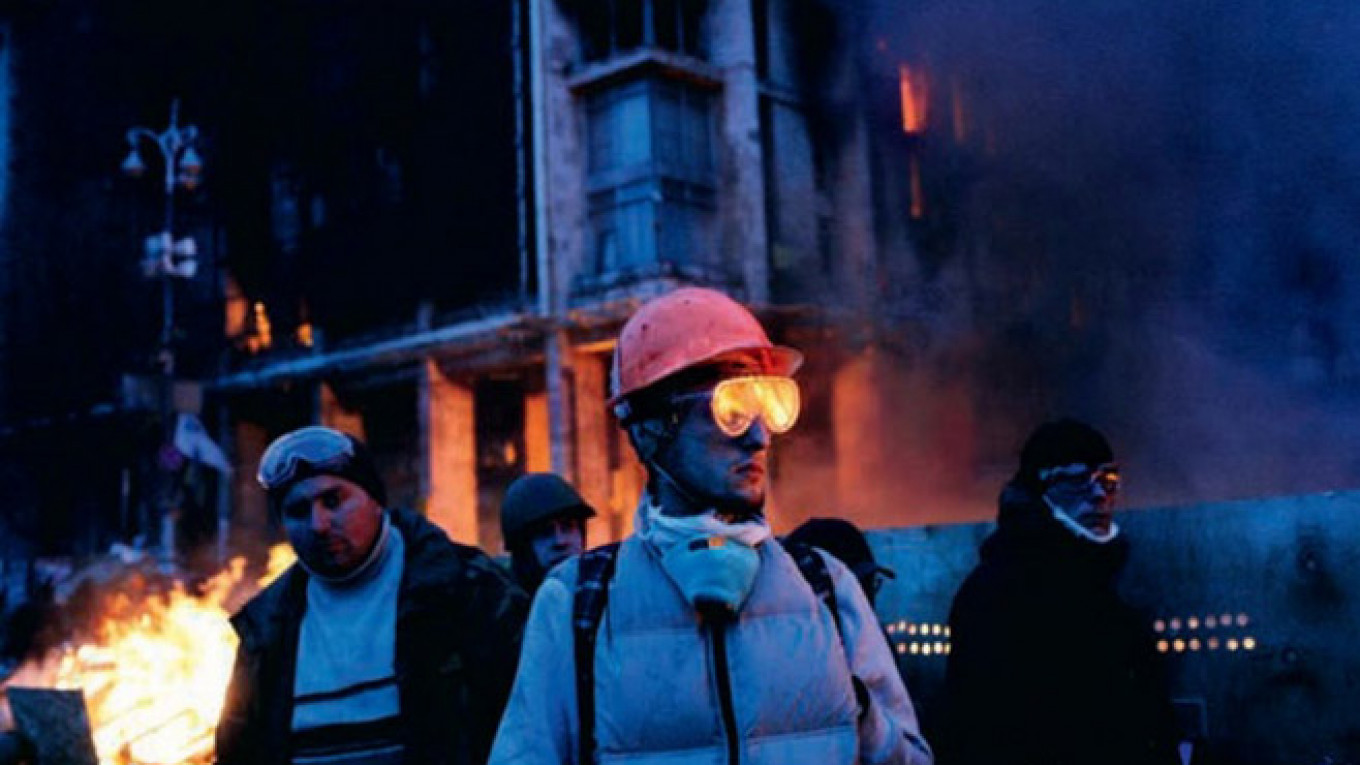"Euromaidan: Rough Cut," a documentary made by young Ukrainian filmmakers about the three-month-long protest in Kiev that drove the former, pro-Russia president, Viktor Yanukovych, out of power, is scheduled to be shown as part of the ArtDocFest documentary film festival in Moscow this week.
Producers Darya Averchenko and Roman Bondarchuk spoke to The Moscow Times ahead of the Russian shows via Skype from Riga, Latvia, where they introduced the film as part of ArtDocFest's screenings within the Riga International Film Festival.
Q: How did you come up with the idea for the film?
Averchenko: We also do the documentary human rights film festival Docudays [in Ukraine], and we had a dilemma about how to open the festival because it started a month after these sad and heroic events on Maidan. We thought that the best we could do was to turn to the directors who filmed the revolutionary protests and ask them for their videos to collect such an almanac.
Bondarchuk: Our festival office is located 50 meters from Maidan and it became a warming center; we had journalists, filmmakers and activists sleeping there, so we saw each other and understood roughly who had what footage. That's why when the time came to have a festival we simply collected the pieces that we thought captured the atmosphere of what happened in Kiev. This is a personal outlook, which will help not only to recreate the chronology but also to feel what we felt last winter.
The chronology is important too because there were a great deal of contradictory reports and disinformation. This wave of propaganda had already started then; nothing was clear and we wanted to show it how we saw it with our eyes.
Q: What was Maidan like for you?
Bondarchuk: The protest was peaceful for about three months: not a single shop window was broken, everybody watched out for each other lest anybody should drink and spoil the peaceful protests. So when a battle on Hrushevsky Street started, we all thought that it was a terrible, ruthless and absolutely hopeless thing, which compromised the revolution for good, and that everything now would be horrible. But it was that this violence that seemed horrible and unacceptable that, in my view, led to the flight of Yanukovych and to the victory of this revolution. Maidan was such a new experience that you can't explain it in just a few words. It was an immense act of transformation of the people who were there from passive contemplators into active participants ready to change things.
Q: How do viewers react to the film?
Bondarchuk: We had a totally unexpected reaction at Docudays UA. The film ends with the song "Plyve Kacha po Tysyni." This is an old Lemko song, essentially a requiem. It was played when the Heavenly Hundred were buried. And we invited Mariana Sadovska, the singer who performs this song, to conclude the screening. She sang at the end of the film. The audience got up and sang along and then sang the anthem, and then some old songs that they knew, and we could not even end the ceremony and close the film theater. It was shortly after Maidan and people probably needed some therapy, to speak to someone about it. And here was an occasion when there were people with the same experience.
"Euromaidan: Rough Cut" is scheduled to be screened Friday at 10 a.m. Formula Kino Gorizont. 21/10 Komsomolsky Prospekt. Metro Frunzenskaya. 800-250-8025. formulakino.ru, artdocfest.ru.
Contact the author at artsreporter@imedia.ru
A Message from The Moscow Times:
Dear readers,
We are facing unprecedented challenges. Russia's Prosecutor General's Office has designated The Moscow Times as an "undesirable" organization, criminalizing our work and putting our staff at risk of prosecution. This follows our earlier unjust labeling as a "foreign agent."
These actions are direct attempts to silence independent journalism in Russia. The authorities claim our work "discredits the decisions of the Russian leadership." We see things differently: we strive to provide accurate, unbiased reporting on Russia.
We, the journalists of The Moscow Times, refuse to be silenced. But to continue our work, we need your help.
Your support, no matter how small, makes a world of difference. If you can, please support us monthly starting from just $2. It's quick to set up, and every contribution makes a significant impact.
By supporting The Moscow Times, you're defending open, independent journalism in the face of repression. Thank you for standing with us.
Remind me later.






